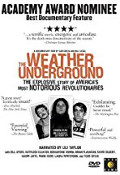
Directed by
Sam Green / Bill Siegel
92 minutes
Rated M
Reviewed by
Ruth Williams

The Weather Underground
Synopsis: The Weathermen were a group of young American activists in the 60s and 70s who decided that the only way to bring the scandal of the Vietnam War to the attention of the American public was to 'bring the war home'. They became known as the Weather Underground once their reputation grew and their names were added to the list of America's Most Wanted. This documentary investigates the history of the group in the context of what was happening in America at the time. Seven of the original members are interviewed more than thirty years later.The film's title comes from Bob Dylan's 'Subterranean Homesick Blues', the full line being, 'You don't need a weather man to know which way the wind blows.' It seemed obvious to the group that too many innocent people were being killed. The lack of response from their fellow Americans seemed criminal, and after years of peaceful demonstrations and still no end in sight, they felt they had to try another tack.
Documentary films are particularly successful when they provide an audience with the opportunity to visit a period in history that otherwise would have been happily put to rest. Watching this film was an eye-opening experience; I had no idea that the Vietnam War had affected these young students so radically that they would be so willing to put their lives on the line. After three of their group died while constructing a bomb, however, they modified their strategies.
The real coup for the filmmakers was to convince so many of the original members to reflect on what they had done and to reflect on why they felt they had to go to such extreme measures. The outcome is fascinating for those of us whose concern about world injustice is a purely philosophical exercise.
Through the radical act of bringing the war home to middle-class Americans, the Weathermen had hoped to wake people out of their stupor and find real solutions to the terrible atrocities that were happening elsewhere in the name of their country. Although now in their late fifties/early sixties, the majority of those interviewed felt their response was completely understandable and there are few regrets. At the same time, they were not as clear as to whether the bombings brought about the changes they were hoping to achieve or how radical social change can be successfully brought about.
Green and Siegel began researching the film in 1998. At the time, it could have appeared irrelevant to an America that was feeling safe and comfortable. When the World Trade Centre was destroyed in 2001, their project suddenly became relevant. Here was an action carried out by a group of people that were using violence to state their case, just as the Weathermen had felt compelled to do all those years ago. The goal of The Weather Underground is to raise questions, not provide answers.

Want more about this film?


Want something different?




